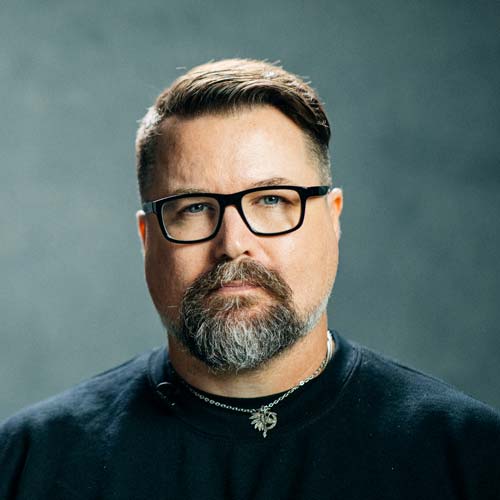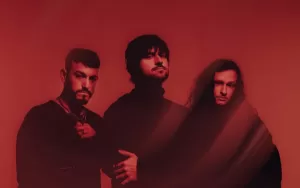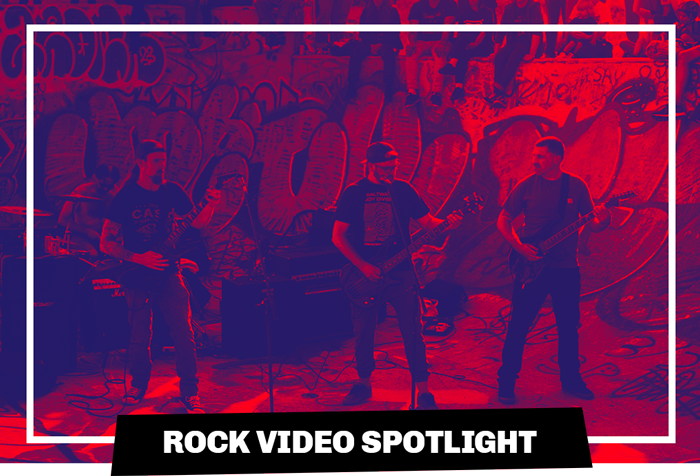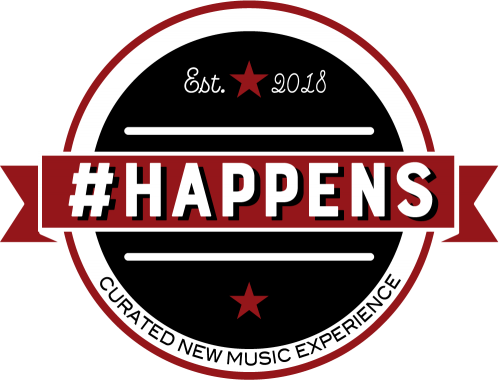
by Ryan J. Downey
ryan@happens.vip
NEVERTEL

NEVERTEL appeared at #HAPPENS this year in Las Vegas, where the Epitaph Records artists told a bit of their story, seated alongside their good friend Cullen Moore of Sleep Theory. I recently caught up with them via Zoom and discussed their origin, evolution, and forthcoming Epitaph Records debut, Start Again, which is set for release on September 12.
NEVERTEL left to right: Raul Lopez (rapper, guitarist, producer, Jeremy Michael (vocalist), Alec Davis (guitarist).
RYAN J. DOWNEY: You all shared part of the story at Happens in February about how everything came together, how each of you connected, and how you know each other. I’d love to hear more about that, especially since it’s moved from project to real band.
RAUL LOPEZ: We started in high school. We’re always in and out of bands. I met Alec for the first time in the ninth grade, and I figured out he played guitar. I was a drummer at the time, and we just started making music. And throughout those years, we were finding new members to join us and do stuff. And then we found Jeremy as a guitar player, and through one of our friends, we just continued to make music in high school, just in and out. We would join bands together, get out, and do stuff like that. We became best friends. We played video games all the time. We hung out a lot of the time and made music for fun.
As we got older, Alec went to college, Jeremy went to college, and I moved away for a little bit, and I gave up on music for a while, just because, I don’t know, it was fun, but also, I just at that time in my life, I was forced to learn how to be an adult.
And then I went to a concert and saw Linkin Park. I realized that’s always what I wanted to do, seeing how people connected with the music. I gave them a call, I think, the next day, and I was, ‘Dude, I really want to make music again. I don’t know why we stopped.’ And they were down.
We would play this game called Destiny, and you can sit in this social space called The Tower. We would send each other demos back and forth. And at that point, we’re not thinking, ‘Yeah, we’re making a band.’ We were just kids playing video games and making music. Eventually, I saw that it was getting really serious, and we all wanted to do something.
We started working on a record called Living Fiction. I moved back to Florida, and Alec moved from Orlando back to Tampa; Jeremy was already in Tampa. We continued to crank out music, man. We just started having fun and making music. From there, we put out the album. And then we just started playing a few hometown shows here and there.
What was it like to move from the studio to the stage?
ALEC DAVIS: Terrifying.
LOPEZ: Because we were such a studio band for so long.
JEREMY MICHAEL: It felt like private rehearsals, as opposed to shows.
DAVIS: The most we ever did was four shows in a month, and it was every weekend.
MICHAEL: We had handfuls of people at the shows.
A lot of your friends, girlfriends, family.
MICHAEL: Yeah. They’re already at the bar. It was a safe space. So, the pressure and the stakes were still low.
DAVIS: At the time, it didn’t feel that way. It was very nerve-racking at the time.
MICHAEL: Now, going from our internet project to our first tour with Beartooth… We had played bigger shows here and there. But going from being a local band, playing our local scene for a while, to then playing 1000 and 2000-cap venues every night was nerve-racking for sure.
LOPEZ: This was always a dream of ours, too, to do this since we were kids, and there was no preconceived plan of being the biggest band ever. It was just that we love this, and if we could pay our bills and do it, that would be amazing. Like Sleep Theory, TikTok was a big part of our upswing. We practiced in a storage unit and decided to start filming ourselves.
DAVIS: To critique ourselves. It wasn’t even for social media,
LOPEZ: And then one day, I put a song on TikTok to see what would happen. It just blew up! And it got on SiriusXM, and it was nuts from there. It’s just crazy. We are very thankful.
What are some advantages of having done it on your own for a long time before inviting people into your process?
LOPEZ: Having a team now is very helpful. However, we’ve also done everything DIY for so long that we know what it takes to do those jobs. I produce all the music. Jeremy did all of our videos, and Alec ran the merch. We did everything in-house prior to getting signed. So, we knew what those jobs entailed, and we knew how to set up the website and push it out before we released a song.
We would sit together for a week prior and plan these things out. It’s super important for bands to know that, because if you get into this industry and you have other people doing it, and you’re just demanding these things, and you don’t know what it takes to get from point A to point B. You’d be lost in that aspect.
Whenever someone asks me, ‘How does our band get a manager?’ My answer is always, ‘Give them something to manage.’
LOPEZ: Yeah. And we still get our hands on a bunch of stuff, even though we have a team.
When you signed with Epitaph, you already had half a million monthly listeners on Spotify. It’s been fascinating to watch that grow in such a short time. It’s nearly doubled since then, and the album isn’t even out yet. What has that felt like?
LOPEZ: It’s insane. We see it a lot at the shows right now, a lot of people that have seen us on our two prior tours that we’ve been on, it’s just overwhelming, and it’s awesome. We love it. We are very thankful for it. We’re just a couple of dudes making music from past experiences, and for people to be able to connect to that, it’s amazing.
When you’re out there on the road and meeting people in person, what are some common things you hear about why they connect to the songs?
LOPEZ: The lyrics. We hear a lot of fans come up to us and say, ‘This song has gotten me through the worst times of my life’ and stuff like that. It sucks to relate, because it sucks that they’ve gone through that too, but we write from things that have happened to us. And especially on this new record, Start Again. These songs mesh lyrically. There are a lot of things that connect, and I’m excited for the fans to connect with those lyrics. We put a lot of effort into what we say in these songs.
Playing live is one thing, but going on tour brings a change to the creative process. Have the responses influenced the type of stuff you’re writing?
LOPEZ: Yeah, yeah, for sure. ‘Can the fans jump to this? Is this cool? Will this take the momentum away live? We’re speaking about that now because we’re playing live.
Tell me about ‘Criminal’ and what it says about Start Again.
MICHAEL: “Criminal” started in Memphis with Dave Cowell, who produces and co-writes a lot of the Sleep Theory stuff. Raul and I flew up to Memphis to hang out with Dave for a week or so. No pressure, no expectations. It was just our first time meeting, and we weren’t sure what we were going to get into. Dave had this idea for a chorus, which was essentially the chorus for ‘Criminal.
He was like, ‘Man, I’ve had this idea, and I’ve always wanted to see it to fruition, but I’ve never really had a band to try it. He just sang me and Raul the chorus to ‘Criminal,’ and we were ‘Holy shit, yeah, that’s so sick.’ We heard that and started running with it. I think we cranked out the song in a day, which is a good sign for Nevertel. That song has been really fun to see translated live, and everyone, even if they don’t know it, loses their mind, jumping around, crowd surfing, because it’s just infectious.
LOPEZ: Before we got signed, we had many potential album tracks, but it usually takes one song to guide our direction. For this album, that song was ‘Criminal.’ After writing it, we realized this was the vibe we needed to pursue. We were excited about it.
So, how do you choose what the next single will be to follow up?
MICHAEL: We never want singles to feel like more of the same. You don’t want to compete with your last release; instead, you want to show a different side each time. Lay down a different card every time you drop a single, rather than churning out too many of the same.
Like Raul says, there’s definitely a vibe and feeling for the record, but it’s still quite diverse. There are many different moods and styles on the record. You can’t release another ‘Criminal’-type song immediately after that. You want to take people on a ride. #

SET THE SUN x DEMON HUNTER “Falling Apart” music video.


